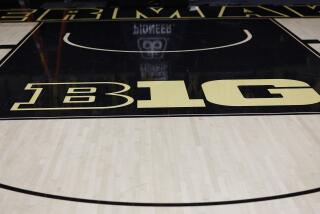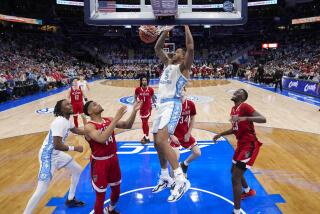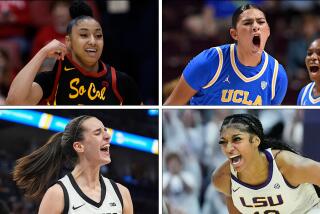War Might Mean Change in Thinking and Channels
Nobody knows.
Nobody knows how the scandals that tarnished college basketball in the last three weeks will diminish our joy in this year’s Valparaiso or Southern Illinois, the little-guy teams.
Will we be thinking that if a St. Bonaventure president can make an end run around academic integrity, what might be going on at IUPUI or Wisconsin Milwaukee?
And will we watch college basketball’s premier event, the NCAA tournament?
Nobody knows.
It might be tipping off just as the United States launches a war against Iraq.
“The NCAA tournament, I think this event is a true slice of Americana,” said Jim Nantz, CBS tournament broadcaster and lover of all sports.
“While the Super Bowl and World Series might get higher ratings, this event somehow rallies American sports fans like no other. For three weeks, it’s a strong cumulative effect with office pools and analyzing brackets. Everybody’s into it. You’ve got the state of Washington interested in the Pac-10 and Gonzaga, you’ve got the state of Florida interested in Florida, the SEC, the ACC.
“This event espouses a lot of American virtues. Cinderella, the love of the underdog, the pure competition that everyone can be involved with, and now it may be coinciding with a time of war. What will the feeling be? What will the interest be? I don’t know.”
Nobody knows.
But Dick Enberg understands.
He understands the delicacy of what might be an emotionally tense time. He knows that his words will need to be chosen carefully. He sees what is happening to the tournament, that it is surrounded by the darkness of ugly revelations at Fresno State, Georgia and St. Bonaventure that resulted in all three schools being pulled from their conference tournaments.
He feels the tension of an approaching war more personally than many of us. Enberg’s nephew, the son of his brother, is in an unknown spot in the Middle East, a Duke grad and a special operations officer whose mission is secret.
“This could be a time of great national crisis and concern,” Enberg said. “My mind will certainly be on national events. But my job will be to broadcast whatever game I’m assigned and that’s what I’ll do.”
Enberg, who was in Los Angeles to broadcast the Pacific 10 tournament for CBS, will also be doing NCAA games for the next three weeks. Enberg was also on the air in 1981, the night the national championship was played in Philadelphia on the same day that President Reagan had been shot in Washington.
“When that game was over,” Enberg said, “I couldn’t remember one single play, one rebound, one basket. Not one moment. And it wasn’t until afterward that we heard how close to death our president had really been.
“To this day I don’t think that game should have been played. This is a different situation, of course. I just don’t know what to expect.”
For one thing, we might have to accept a different television situation. In case war in Iraq has begun, CBS has contingency plans to broadcast games on other cable networks -- most probably ESPN, with perhaps some games on TNN.
There might not be the same technical ability to channel us from one big moment to the next in a city-by-city fashion, to cut into every one of the 32 first-round games to capture every close finish or brilliant play.
Murray Sperber, an Indiana University professor of English and American studies and an expert on the role of sports in American society, says it “will be quite fascinating to see how fans of today might handle broadcasting more like it was in the 1970s. Will fans understand or will they be angry? Will they even watch if the war has started? I don’t know.”
CBS studio host Clark Kellogg said he doesn’t know how he, or anyone else, will respond to handling a major sporting event in a time of war.
“I think we’ll go with our conscience, our emotions, how our gut feels at that time,” Kellogg said. “I don’t think anybody can say how they will respond. Not us, not the fans.”
Said Nantz: “As our president has said, we do have a responsibility to try and keep life as normal as possible in a time of crisis. But ‘sobering’ is a perfect word. When you start talking about war, you realize how insignificant it is to be talking about who got a No. 2 seed versus a No. 3 seed or to be complaining about the pod system. On a larger scale, it doesn’t seem like all that really matters.”
Or maybe it does.
For news-starved Marines at Camp Matilida, headquarters for the 1st Marine Division in the Kuwaiti desert, questions about March Madness are second only to questions about whether President Bush has picked a date for war to begin.
“What about Indiana?” a Marine in the chow hall asked a reporter. The news wasn’t good. The Hoosiers were becoming a bubble team. “Damn,” the Marine said. “First a war, now this.”
With luck, that Marine will quickly get the word -- Indiana got in.
Sgt. John Wasilowski, of Truth or Consequences, N.M., has an added reason to despise Saddam Hussein.
The 25-year-old is a fan of Arizona, but he won’t be able to watch or listen to games -- no televisions or radios in forward locations -- and he might not hear the results for weeks. There is no newspaper delivery and Internet is a dim memory.
“He owes me for making me miss this,” Wasilowski said.
And maybe that says it all. Nothing resonates like the NCAA tournament among Americans, sports fans or not.
Mike Messner, a USC professor in the department of sociology and past president of the North American Society for the Sociology of Sports, says that no matter what, sports fans will watch their tournament.
“On television,” Messner said, “war will be presented as carefully scripted entertainment. College basketball will be presented as patriotically nationalistic. And both will be brought to us by GM and the major oil companies.”
Clickers in hands, belief suspended, let the bracket filling begin.
*
Diane Pucin can be reached at diane.pucin@latimes.com
More to Read
Go beyond the scoreboard
Get the latest on L.A.'s teams in the daily Sports Report newsletter.
You may occasionally receive promotional content from the Los Angeles Times.










